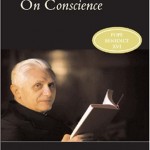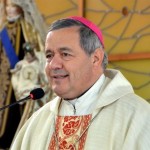Over the past week, in correspondences with friends, I’ve wondered how Pope John Paul II -whom I revere for a holy man- was such a poor judge of character? He named so many weak bishops, and seemed to believe people he should not have. When this story broke about Fr. Maciel, I had to wonder again: was JPII a deplorable judge of character?
After reading that, I wrote to someone, “It seems like JPII was the charismatic hero, leading the parade, and Cardinal Ratzinger was the homely little guy with the shovel and broom at the end.”
My plan was to explore the notion further in a blog post. But Ross Douthat has done it, and better than I would have:
The world didn’t always agree with Pope John Paul II, but it always seemed to love him. . . .
But there’s another story to be told about John Paul II and his besieged successor. The last pope was a great man, but he was also a weak administrator, a poor delegator, and sometimes a dreadful judge of character.
The church’s dilatory response to the sex abuse scandals was a testament to these weaknesses. So was John Paul’s friendship with the Rev. Marcial Maciel Degollado, the founder of the Legionaries of Christ. The last pope loved him and defended him. But we know now that Father Maciel was a sexually voracious sociopath. And thanks to a recent exposé by The National Catholic Reporter’s Jason Berry, we know the secret of Maciel’s Vatican success: He was an extraordinary fund-raiser, and those funds often flowed to members of John Paul’s inner circle.
Only one churchman comes out of Berry’s story looking good: Joseph Ratzinger. Berry recounts how Ratzinger lectured to a group of Legionary priests, and was subsequently handed an envelope of money “for his charitable use.” The cardinal “was tough as nails in a very cordial way,” a witness said, and turned the money down.
This isn’t an isolated case. In the 1990s, it was Ratzinger who pushed for a full investigation of Hans Hermann Groer, the Vienna cardinal accused of pedophilia, only to have his efforts blocked in the Vatican. It was Ratzinger who persuaded John Paul, in 2001, to centralize the church’s haphazard system for handling sex abuse allegations in his office. It was Ratzinger who re-opened the long-dormant investigation into Maciel’s conduct in 2004, just days after John Paul II had honored the Legionaries in a Vatican ceremony. It was Ratzinger, as Pope Benedict, who banished Maciel to a monastery and ordered a comprehensive inquiry into his order.
So the high-flying John Paul let scandals spread beneath his feet, and the uncharismatic Ratzinger was left to clean them up.
You’ll want to read the whole thing. Douthat is everything Maureen Dowd is not.
In fact, if one reads Dowd’s myopic hysteria and then Douthat’s measured thoughtfulness, you can’t help but think, that Dowd does her cause more harm than good every time she gets near a keyboard.
UPDATE:
George Weigel also writes thoughtfully about the long, long Lent of 2010:
Reasonable people whose perceptions are not warped by the toxin of anti-Catholicism or who are not pursuing other (often financially-driven) agendas now recognize that the Church in the U.S. and Canada has bent enormous efforts towards cleaning up what Cardinal Ratzinger called in 2005 its “filth,” to the point where the Catholic Church today can be empirically shown to be the safest environment for young people and children in North America. The paralyzing drumbeat of one ghastly new story after another that went on all during 2002 has not been repeated. What we now have is, largely, the recycling of old material, usually provided to the press by contingent-fee attorneys whose strategic goal is to build a public “narrative” of conspiracy that will shape American courts’ decisions as to whether the Vatican and its resources can be brought within range of U.S. liability law.
The realization among serious Catholics that this is not 2002 and that things have changed dramatically since 2002, has led to a far more confident effort to fight back against misrepresentations such as those the Times perpetrated on March 25. There is a danger here: to recognize that this is not 2002 cannot blind us to the fact that there are wounds that remain to be healed, reforms of priestly formation that remain to be completed, bishops whose failures remain to be recognized and dealt with, new norms for the selection of bishops to be implemented, and accounts rendered as to why the Vatican, prior to Ratzinger’s taking control of the issue of clerical sexual abuse in the late 1990s, was sometimes sluggish in its response to scandalous behavior by priests and deficient leadership by bishops.
Assuming, however, that Benedict XVI has set in motion processes that will lead to all those lingering issues being forcefully addressed, a serious question can now be credibly posed: Are those most vigorously agitating these abuse/misgovernance issues today genuinely interested in the safety of young people and children, or are they using the failures of the past to cripple the moral credibility of the Catholic Church in the present and future? That question would have rightly struck many people as a dodge in 2002. It cannot be credibly regarded as a dodge today, because of what the Church has done since 2002 (and, indeed, since the 1990s, when the plague of abuse within the Church began to recede)
Weigel discusses improvements made and the lingering/glaring weaknesses that remain. He writes, though:
Despite these [recent media] missteps, however, the truth seems to have gotten out, if slowly and incompletely: the single most influential figure in reshaping the Roman Curia’s attitude toward these scandals and the Church’s legal practice in dealing with them, was Joseph Ratzinger, now Benedict XVI.
The plaintiff’s bar cannot concede this, for to do so would be to destroy the narrative it has been selling to the world media; Ratzinger’s enemies cannot concede this, for they have never been able to find good in him; and European secularists cannot concede this, for in their minds the Church is, in principle, irreformably corrupt—Voltaire’s L’infame. But those willing to look at facts and evidence have begun to understand just how crucial a role Ratzinger played in ensuring that 2010 did not automatically become 2002 redivivus.
It seems to me that Benedict needs to speak directly to people, not through the Vatican and not via the filters of media who often do not understand what they are looking at. I think it would be a very good thing if Benedict made a public statement that conveyed his own thoughts -I’m sure he would be both apologetic and direct- about the abuse scandals, where mistakes were made, what has changed and what is still to be done, it would be helpful both to the victims who need reassurances that others will never have to deal with what they’ve experienced (and who are being ill-served by the reluctance of some to credit the church with its successes) and to the general public. I think he needs to do it, soon. As Weigel writes:
[Benedict needs to put out] a comprehensive and documented narrative of the case of a predatory Munich priest which was mishandled during Ratzinger’s tenure as archbishop there—the revelation of which was the European ground zero for the latest set of explosions—would be published. It would also be helpful if the Holy See would provide a user-friendly explanation of how abusive priests are laicized, and how this process has been streamlined and accelerated, again under Ratzinger’s leadership. There is no harm in acknowledging that, like just about everyone else, Joseph Ratzinger was on a learning curve in dealing with abusive clergy and malfeasant bishops; the point to be stressed, however, is that he learned faster, and acted more decisively on what he had learned, than just about anyone else.
And then, of course, more needs to be done.
This is not a matter of appeasing the media pack and its baying for blood; it is a matter of self-respect and the integrity of the Church’s institutional life.
As with Douthat’s piece, Weigel is a must-read











